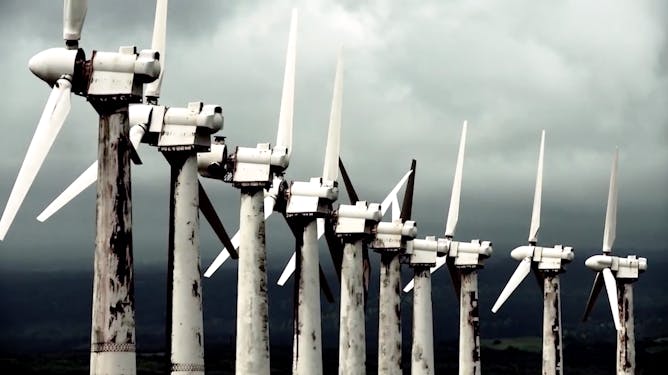|
|
|
Editor's note
|
|
Filmmaker Michael Moore doesn’t mind putting a few noses out of joint. And so it is with his latest film Planet of the Humans, which has turned him from a darling of the left to its public enemy #1.
The documentary, on which Moore was executive producer, was released on YouTube and at the time of writing had been watched more than 6.5 million times. It purports to say what “no one else will” – that technologies such as renewable energy are nowhere near as clean as they claim to be.
The response from environmentalists and clean energy advocates has been fast and furious. And predictably, climate deniers are championing the film. So where does the truth lie? Griffith University emeritus professor Ian Lowe today draws on his 50 years of experience studying the energy sector to answer that question.
His balanced, nuanced take reveals the film’s many blunders. But he says the film’s overall message – that infinite growth on a finite planet is “suicide” – is irrefutable.
Lowe’s piece is a good example of why The Conversation exists – to draw on deep expertise to sort facts from the hyperbole. But we cannot continue without your support. This week we launched our annual reader donation campaign, inviting those who like what we do to give. Your tax-deductible donation will help raise the voices of experts above the misinformation that thwarts progess at a time when change is so badly needed.
|
Nicole Hasham
Section Editor: Energy + Environment
|

|
|
Top stories
|

planetofthehumans.com
Ian Lowe, Griffith University
Environmentalists say the new film has caused untold damage at a time when change has never been more urgent. So why is it so controversial?
|

Shutterstock
Adrian Bauman, University of Sydney; Leah Shepherd, University of Sydney; Melody Ding, University of Sydney
A study from France concluded smoking might protect against coronavirus. But particularly now, in the midst of a pandemic, it's critical we don't take headlines at face value.
|

David Mariuz/AAP
Michelle Grattan, University of Canberra
An ANU study providing a longitudinal examination of the effects of the coronavirus shows a rise in trust in government, and a fall in perceived job security.
|
Science + Technology
|
-
Heide Lukosch, University of Canterbury; Andrew M. Phelps, University of Canterbury
A deadly 'disease' that tore through World of Warcraft in 2005 helped scientists realise games are powerful tools for understanding complex situations such as the ongoing coronavirus pandemic.
|
|
Environment + Energy
|
-
Sunil Venaik, The University of Queensland
The response of individual nations to coronavirus has largely been ad hoc, piecemeal and in many cases, lethally ineffective – just like climate action.
|
|
Arts + Culture
|
-
Anna M. Kotarba-Morley, Flinders University
The COVID-19 pandemic has closed museums and cultural sites worldwide. Meanwhile, curators are already working hard to preserve the current moment so that future generations may understand it.
-
Cherine Fahd, University of Technology Sydney
Carriageworks is not a conventional art space. It is a space of and for community.
|
|
Cities
|
-
Silvia Tavares, University of the Sunshine Coast; Nicholas Stevens, University of the Sunshine Coast
When urban spaces work well they are highly social spaces. How do we safely manage them and people's fears about mingling when ‘being together but apart’ is the norm?
-
Larissa Hjorth, RMIT University; Sybille Lammes, Leiden University
Playgrounds might have been closed, but play remains important for the social fabric of cities and for reimagining the possibilities that are open to us.
|
|
Politics + Society
|
-
Marie Segrave, Monash University
If Australia wants to avoid a Singapore-style spike in COVID-19 cases, it must encourage its unlawful migrant workers to come forward for testing.
-
Michelle Grattan, University of Canberra
Anthony Albanese, who will campaign in Eden-Monaro on Thursday, has lost any possible claim to “underdog” status in the coming byelection. The idea of Labor as underdog was always dubious in light of history…
-
Michelle Grattan, University of Canberra
Michelle Grattan talks with Nev Power, the chairman of the government's National COVID-19 Coordination Committee.
-
Aileen Marwung Walsh, Deakin University; Laura Rademaker, Australian National University
Aboriginal communities have a long history of fighting off disease outbreaks – and self-determination is vital to their success.
|
|
Health + Medicine
|
-
Michael Vagg, Deakin University
Chronic pain is everyone's problem. It's costly, debilitating and, according to new statistics, increasingly common. Reversing the trend is achieveable but far from easy.
-
Karin Hammarberg, Monash University; Luk Rombauts, Monash University
Expect fewer visits to the clinic, fewer people in the waiting room at once, and temperature checks.
-
Ian Hickie, University of Sydney; Stephen Duckett, Grattan Institute
The pandemic has health professionals all around the country reaching out to their clients online. It's a trend we should continue, to ensure the most disadvantaged don't miss out on care.
|
|
Business + Economy
|
-
Kevin Davis, University of Melbourne
Westpac and the ANZ have suspended dividends payments. The National Australia Bank has slashed them. The peculiarities of our tax system explain why retirees hate this more than they should.
|
|
| |
Featured jobs
|

|
— Canberra ACT, Australia
|
|
|
|
| |
| |
| |

|
| |
| |
| |
Featured Events & Courses
|

|
Level 21, 15 Broadway, Ultimo, New South Wales, 2007, Australia — University of Technology Sydney
|

|
Brisbane (Venue TBC), Brisbane, Queensland, 4000, Australia — Australia New Zealand School of Government
|

|
Online webinar, Perth, Western Australia, 6027, Australia — Edith Cowan University
|

|
Online webinar, Perth, Western Australia, 6027, Australia — Edith Cowan University
|
|
|
|
| |
| |
| |
| |
| |
|
|
|
|
|
|
|